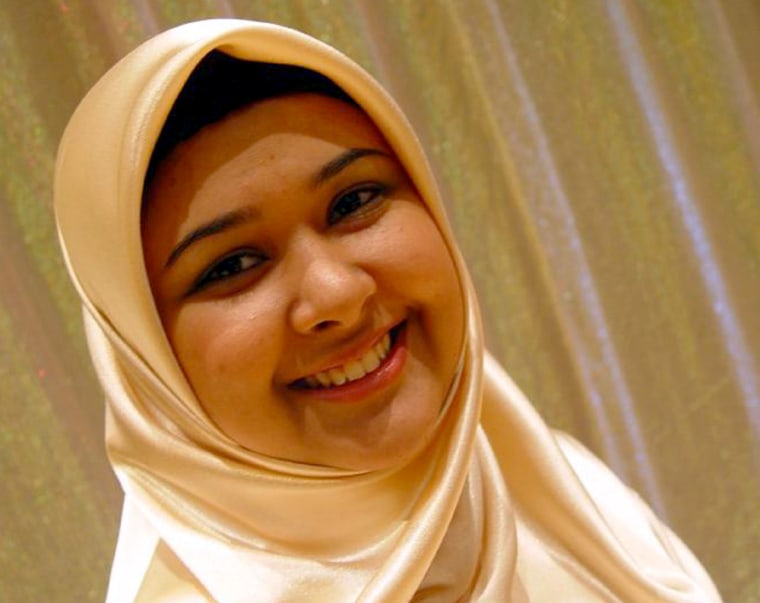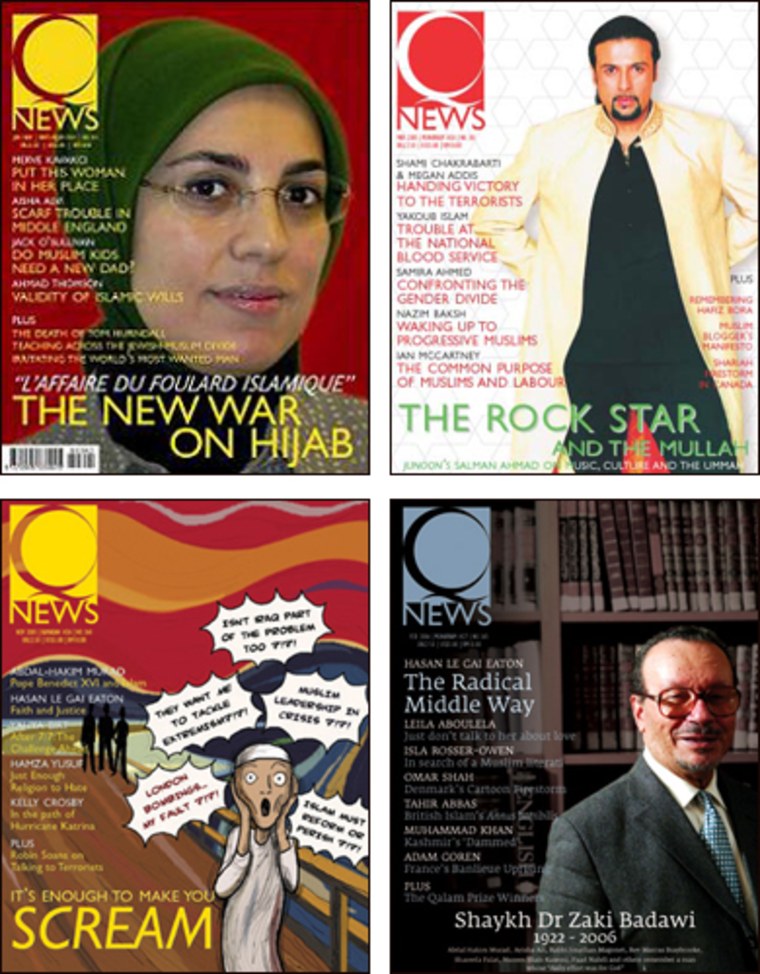Fareena Alam’s life doesn’t sound too different than the starving artists in New York’s East Village in the ‘70s and ‘80s-- a struggling journalist, living in the center of London, who is desperately trying to make ends meet by doing the work she loves. She picks up enough freelance work to pay most of the bills and takes in roommates to help pay the rent on the apartment she shares with her husband.
What makes her a little different is that Alam is the managing editor of Q News, the only serious Muslim news magazine in Britain, and her background mirrors those of thousands of other young Muslims here who are caught between two cultures.
While clerics on trial and protesters threatening violence are the most prevalent images of Muslims in Britain, moderates such as Alam are working hard to combat the stereotypes.
Q News along with the Khayaal Theater Company and the social group The City Circle are working hard to spread a message of tolerance, inclusiveness and openness to the outside world.
Through their work, the three organizations are slowly creating a new discourse for the community. Each group faces similar pressures — mainly financial — and it’s a statement of the size of the moderate movement that the leaders of each of these groups are well acquainted, although no formal ties exist between the organizations.
‘The confidence to disagree’
Alam’s parents came to Britain from Bangladesh to work and left several years later to Singapore where she was raised. After a religious reawakeningof sorts, she returned to Britain with her family at age 21, wearing a headscarf and hoping to find a job with a Muslim organization.
“I always felt out of place in Singapore,” said Alam, who is a British citizen. “I’m not Bangladeshi; I go back there and don’t fit in at all. Then you come here and with all the problems — integration, discrimination —you don’t feel like you belong here either. The only thing to hold onto is Muslim identity.”
Muslims are returning to the traditions of their faith in higher numbers in Britain, according to Alam. However, the community at large is strongly in favor of integration and accepting Western values.
A large majority of British Muslims believe that immigrants should integrate fully into British society, learn English and pledge their primary loyalty to Britain, according to a BBC/Mori poll conducted in August.

Slowly these views are being reflected in the lifestyle of the community. When at one time it would have been revolutionary to have a woman editing a Muslim magazine, it is now normal. And with so many challenging and troubling issues facing the religion, there is a higher level of comfort in openly discussing problems in the Muslim community.
Under Alam’s watch, the magazine has helped bring once-taboo subjects like extremism, teenage rebellion and mental health out in the open.
“Now Muslims are demonstrating against Muslims,” she said referring to counter-protests after the violent London demonstration against the Muhammad cartoons published in a Danish newspaper. “The community now has the confidence to disagree.”
The presence of Muslims in Britain is fairly recent. A large part of Britain’s Muslims emigrated from South Asia and other former British colonies in search of economic opportunity during the 1960s. Now, decades later, their children are British citizens, speak fluent English and have more of a connection to the rainy streets of London than the dusty villages of Pakistan.
These children are caught between two worlds struggling to find their way. But with few organizations and little established infrastructure to guide them, it is too easy to fall into the extremism preached by foreign clerics, who are often imported by the community from other countries.
‘More to offer than fatwas and violence’
Luqman Ali and his Khayaal Theatre Group is attempting to bridge this cultural gap, organizing productions based on traditional Islamic literature and presented in a Western medium.
“For young Muslims born and raised in the West it offers a positive representation of their culture that will give them a greater degree of confidence and worth in the West,” said company director Ali, 36, a second-generation African-American Muslim who moved to Britain 20 years ago.
Khayaal is the only theater company in Britain dedicated to producing Muslim works. He started the company with friends in 1997 after studying the languages and literature of the Muslim world, and the group set out to reignite a passion for the arts in a community that was “culturally deprived and malnourished.”
“The Muslim community is ill-equipped to express itself,” said Ali, who has been invited to schools around England to teach about Muslim arts and literature. “When you can’t express and tell story as you see it, it leads to problems — chiefly isolation, the inability to integrate and frustration.”
Ali has perhaps as much at stake personally in the success of Muslim integration as the entire Muslim community. As the son of Muslim converts, most of Ali’s extended family is Christian and his wife’s father is a Christian minister.
“We’re trying to say to non-Muslims that Muslim culture has much more to offer than fatwas and violence,” said Ali, noting that the group has seen a surge of interest from cultural groups around the world since Sept. 11, 2001, and the July 7, 2005, London bombings.
‘Progressive, tolerant and moderate’
Recently, on a cold Wednesday evening in London, about 125 people filled a meeting room near one of the city’s main rail stations. Most appeared under 30, almost all were Muslim and they gathered to hear Muslim academic Tariq Ramadan.
Ramadan, a Swiss citizen, is renowned in the Muslim world for his moderate views and taught at Notre Dame in Indiana until the U.S. State Department revoked his visa in 2004.
That night he spoke on the pressing need for Europe’s Muslims to integrate – including greater political involvement, fluent English, and support to local charities instead of charities “back home.”
“We need to be open to the surrounding culture,” said Ramadan, now a visiting professor at Oxford University.
An earlier speech by Ramadan on why Islam needs a feminist movement drew so many people that the organizers had to find a new place to meet. A quick survey of the room revealed an audience as diverse as the Muslim community in Britain — some men wore jeans, others traditional robes. Some women wore business suits; others were covered with hijabs and loose dresses.
“People should see in you what they don’t see on their TV set,” said Ramadan. It was with reluctance that the crowd left after more than two hours in the stuffy room, taking with them the too-seldom discussed ideas about Muslims’ role in Europe.
City Circle
The talk was one in a series of lectures by Ramadan on the need for reform within Islam and hosted by the London social organization, The City Circle.
The group was started by a group of Muslim professionals in 1999 as a social outlet and has since morphed into an organization that is now setting the agenda for moderate Muslims.
From their work feeding London’s homeless, to the Holocaust memorial they sponsored after the Muslim Council of Britain refused to participate in a city-wide ceremony, The City Circle has become a national model of British Islam and local groups around the country have started to duplicate the organization’s efforts.
“Our differences are part of the game plan,” said Asim Siddiqui, 29, one of the group’s founders, who works as a forensic accountant in London’s financial district.
He hopes that through City Circle, and his friends’ work at Q News and Khayaal, a “progressive, tolerant and moderate” Islam will spread throughout the community.
Quoting the Quran, he said, “We were made with differences to learn from one another.”
